 Petzlover
Petzlover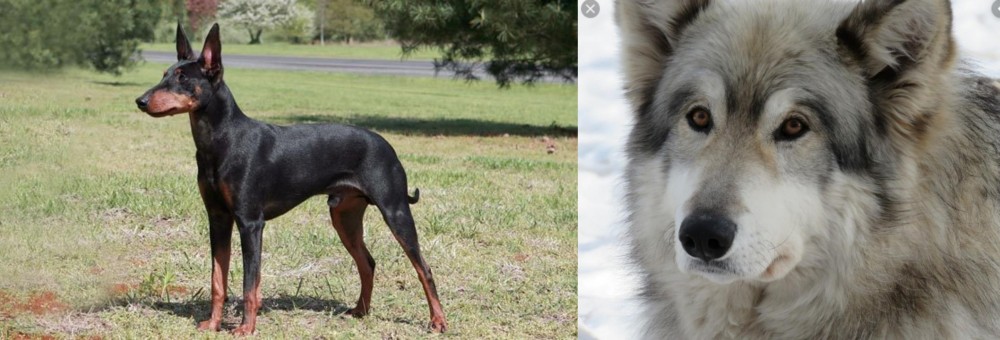 Manchester Terrier is originated from United Kingdom but Wolfdog is originated from Germany. Manchester Terrier may grow 46 cm / 18 inches shorter than Wolfdog. Manchester Terrier may weigh 41 kg / 90 pounds lesser than Wolfdog. Manchester Terrier may live 3 years more than Wolfdog. Manchester Terrier may have less litter size than Wolfdog. Manchester Terrier requires Low Maintenance. But Wolfdog requires Moderate Maintenance
Manchester Terrier is originated from United Kingdom but Wolfdog is originated from Germany. Manchester Terrier may grow 46 cm / 18 inches shorter than Wolfdog. Manchester Terrier may weigh 41 kg / 90 pounds lesser than Wolfdog. Manchester Terrier may live 3 years more than Wolfdog. Manchester Terrier may have less litter size than Wolfdog. Manchester Terrier requires Low Maintenance. But Wolfdog requires Moderate Maintenance
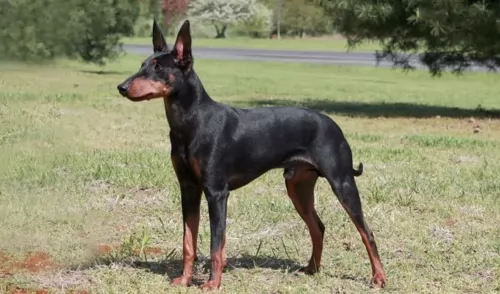 Looking much like the Black and Tan Terrier, the Manchester Terrier is a dog that was actually developed from the Black and Tan, which is the oldest known breed of terrier.
Looking much like the Black and Tan Terrier, the Manchester Terrier is a dog that was actually developed from the Black and Tan, which is the oldest known breed of terrier.
In the United States there are 2 varieties of the Manchester Terrier — the Toy and the Standard but in the UK the 2 sizes are classified as different breeds - the English Toy Terrier and the Manchester Terrier.
The dog was first bred in the 19th century to wipe out rats and mice, originating from Manchester, England. This is an old dog breed, gaining the nickname of the Gentleman's Terrier because of its dignified looks and personality.
After the 2nd World War, the numbers of the dog dropped and this spurred the kennel club to list it as a vulnerable native breed, in danger of extinction. It was in 1937 that the British Manchester Terrier Club was formed.
 The Wolfdog was brought about when domestic dogs were mated with a variety of wolves so as to produce a hybrid.
The Wolfdog was brought about when domestic dogs were mated with a variety of wolves so as to produce a hybrid.
People who want to own these hybrids have to be careful because they find that the unpredictable behavior of their pets makes it difficult for them to care for them.
Then they want to get rid of it. Every year, heaps of these hybrids are abandoned due to humans interfering with nature.
The wolfdog has been bred with a number of dogs but we think about it more in terms of wolf and German shepherd.
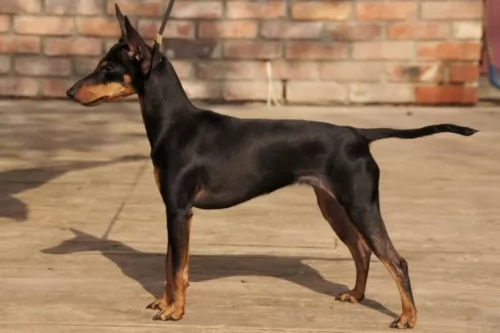 The Manchester Terrier is a small, smooth haired dog with a black and tan coat and a head with a fairly long muzzle, small bright eyes, largish erect ears and a deep chest.
The Manchester Terrier is a small, smooth haired dog with a black and tan coat and a head with a fairly long muzzle, small bright eyes, largish erect ears and a deep chest.
The body is lean and muscular and the tail, where once docked, now tends to be left long. In the toy sized dog you will find him standing at roughly 25 – 30cm in height and he will weigh between 2 to 4kg. The standard sized dog will be slightly taller and heavier and weigh in the region of 8kg.
You can expect between 2 – 4 puppies from a breeding pair.
Feisty, energetic, alert and intelligent are some of the words which describe the Manchester Terrier. Like any other dog, training and socialization will make him a splendid pet, obedient and amicable among people.
He is loving and loyal, courageous and feisty and guaranteed to make you an eager-to-please pet. He can adapt to life in the city or countryside, but is going to need plenty of exercise wherever you keep him as a pet.
 People mesmerized by the wolf long to bring some of that wildness home, and the wolfdog is supposed to do this.
People mesmerized by the wolf long to bring some of that wildness home, and the wolfdog is supposed to do this.
Their looks differ a lot, even those that come from the same litter. You can’t have a predictable looking wolf dog because it could be any domestic dog bred with a wolf so they display a large variety of appearances.
Most Wolfdogs seem to have smaller heads than pure wolves. The ears seem to be bigger and more pointy.
A popular wolfdog mix is a German Shepherd mixed with the wolf. These dogs can be between 70 to 76cm in height and weigh between 40 and 45kg.
Their coat is thick and can be in colors of grey, cream, red, white, dark brown and black.
While the wolfdog can be trained to become quite a friendly kind of dog, it is not suitable for the first time dog owner. It can show bouts of aggressiveness around strangers and be highly protective of its family.
However, this can be helped with early socialization and training. It is illegal to own the wolfdog in some states. You don’t want to leave a wolfdog alone with your children even though the dog is capable of love and loyalty towards his human family.
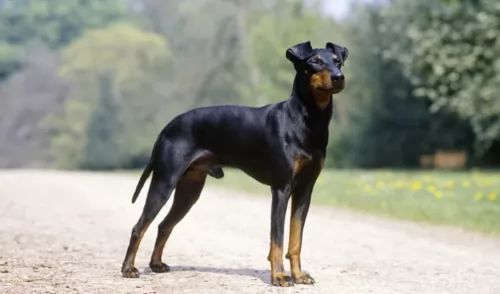 The Manchester Terrier has so many good qualities that make him such a good pet. Low maintenance, he is clean and well groomed to look at. He is also a healthy dog breed, nice and active and low maintenance.
The Manchester Terrier has so many good qualities that make him such a good pet. Low maintenance, he is clean and well groomed to look at. He is also a healthy dog breed, nice and active and low maintenance.
This little dog is willing to come into your home and heart. He will make you a wonderful pet and friend for as long as 15 years if you take special care of him.
 When you add the genes of a wild animal to the pool, you get a crossbreed and when its an animal from the wild, its nature is unpredictable.
When you add the genes of a wild animal to the pool, you get a crossbreed and when its an animal from the wild, its nature is unpredictable.
Many people don’t think about the consequences of what they do when they interfere with nature and the wolfdog gets put down when it behaves like a wild animal and attacks or bites out of defense.
Yes, they can be loyal, loving pets but always you will have the shadow of the dog or wolf’s unpredictable behavior.
There is a reason why these dogs are banned in a number of states. This dog-type-wolf breed is not recommended as a pet at all – take a look at animal shelters and the number of wolf dogs there and ask yourself why.
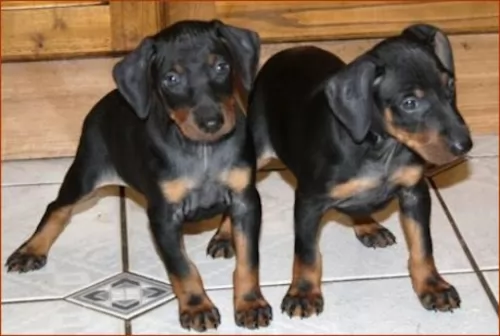 This dog breed is fairly healthy and can reach a good age if looked after well. Every dog though, can be affected by a number of inheritable genetic disorders.
This dog breed is fairly healthy and can reach a good age if looked after well. Every dog though, can be affected by a number of inheritable genetic disorders.
Glaucoma is a common genetic condition in Terrier breeds, including the Manchester Terrier. Secondary glaucoma, which is known as lens luxation is brought about when there is excessive pressure in the eyeball. The lens of the eye is put out of alignment. Most times surgery is the solution.
Von Willebrand's Disease is a blood disorder that affects the clotting process. A dog with this disease will have bleeding gums, continuous bleeding after surgery and sometimes blood in the stool. It’s a disease which can’t be cured but it can be managed with treatments.
 They will also be susceptible to common dog ailments such as parasites and hip dysplasia.
They will also be susceptible to common dog ailments such as parasites and hip dysplasia.
Like any other dog, these Wolf dogs will also possibly develop tumors. He will also need to be vaccinated against harmful diseases and you will need to have a reliable local vet who is interested in your wolf dog.
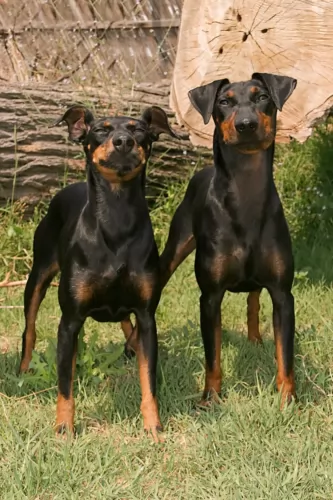 Low maintenance, the Manchester Terrier will only require a brushing once or twice a week. Check his eyes and ears for infections, clip his nails and brush his teeth 2 or 3 times a week.
Low maintenance, the Manchester Terrier will only require a brushing once or twice a week. Check his eyes and ears for infections, clip his nails and brush his teeth 2 or 3 times a week.
The Manchester Terrier is a lean, muscular dog and you want to be sure to keep him that way. If you feed him commercially manufactured food, make sure that it is one of the high quality brands – food which is packed full of vitamins and minerals to ensure the health of your dog.
Any packaged food you buy should be appropriate to the dog’s age and his activity levels. You won’t be doing your dog a favor by feeding him treats that you enjoy such as chocolate, coffee, peanuts, raisins, grapes and onions.
Dogs want simple food that don’t change much. Keeping things simple prevents upset stomachs. Give him some wholesome home-made food occasionally to add into his dry kibble. This can be boiled chicken, brown rice or pasta and some cooked or raw vegetables such as potatoes, carrots and spinach. Some raw meat added in from time to time can also do wonders for your dog. Make sure he has access around the clock to fresh, cool water.
The Manchester Terrier wants lots of exercise, and apart from him having his regular daily walks, he will need runs off the leash in the park. If you go cycling for instance, he will readily run beside you.
 If you own a wolfdog the same care procedures would need to be followed as you would with a regular dog.
If you own a wolfdog the same care procedures would need to be followed as you would with a regular dog.
A wolfdog, however, can’t be vaccinated against rabies. It seems that the reason for this is that it is due to current legislation, and vaccine manufacturers don’t want to support wolf dogs as pets because they are considered to be dangerous.
Provide your wolfdog with highly nutritional, protein-based food. You don’t want to feed your wolfdog any of the low quality, traditional store-bought food high in carbs and artificial additives. Instead, look for a diet rich in proteins and be sure to give this dog some raw meat occasionally.
The dog is active and you will need to provide heaps of exercise for him, both mental and physical activities.
The wolfdog will require training but it will require dedication, though it can be done as the dog is very intelligent.
Even with training, the wolfdog isn’t suited to life in the city but should be kept in the countryside.